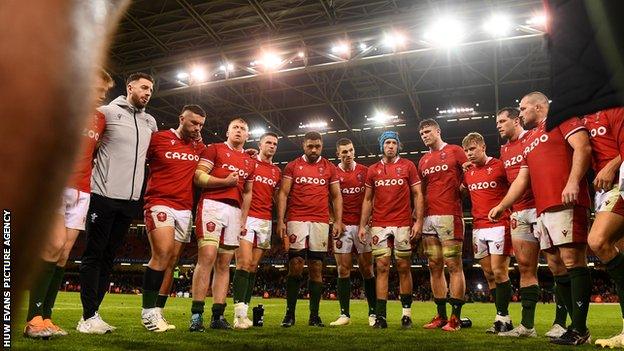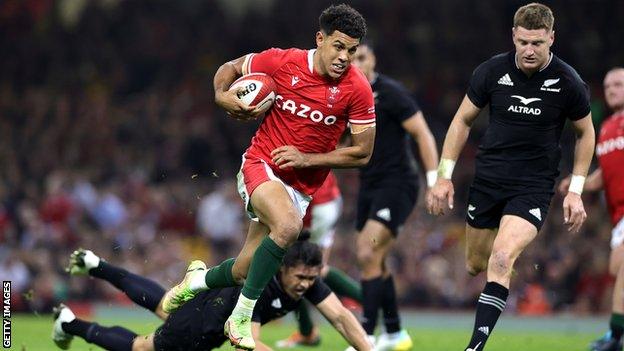Wales 23-55 New Zealand: Same old story as All Blacks highlight Welsh weaknesses
- Published

Wales players reflect on the 55-23 defeat against New Zealand
We have seen this film before. The script has been written and there have been countless sequels to Wales' woes against New Zealand.
Pre-match optimism developed before Wales were overpowered on Saturday by an All Blacks side who registered a 33rd consecutive victory in the fixture's one-sided history.
New Zealand were last beaten by Wales in 1953 and 25 of the victories since have been by a margin of 15 points or more.
The 2022 version saw the All Blacks score eight tries and a record number of points against Wales in their 55-23 win at Cardiff's Principality Stadium.
There was the usual Wales slow start as the hosts found themselves 17-0 down after 19 minutes.
Then came the hope as a try from skipper Justin Tipuric after 51 minutes reduced the deficit to six points early in the second half.
However, the inevitable conclusion followed as the All Blacks dominated the final half-hour, romping away with four further tries and 26 unanswered points.
The defeat represented the second successive year Wales shipped 50 points against the All Blacks in Cardiff.
It also equalled the highest amount of points Wales had conceded against New Zealand, after Steve Hansen's 2003 Welsh side had also coughed up 55.
So we face another inquest into just why Wales cannot beat the All Blacks, as memories of an encouraging summer in South Africa fade.
Passive defence and exasperating exits
A porous defence is not an accusation that could be levelled at Wales during the summer tour of South Africa, but the rearguard resistance proved passive against New Zealand.
Wales conceded eight tries and the All Blacks were not made to work that hard for many of their scores, as they almost crossed at ease when entering the hosts' 22.
Wales missed 24 tackles, many of them important challenges, including a collector's item of a failed Tipuric attempt. You cannot do that against New Zealand.
Wayne Pivac's side were also guilty of too many individual errors and receiving restarts also needs urgent attention.
Exiting their 22 after kick-offs, Wales were consistently inaccurate and a prime example was when the hosts had battled back to 29-23 early in the second half.
A wayward kick gave New Zealand the platform to cross for a crucial try and there was no way back for the home side as the All Blacks dominated the final quarter.
Off the pace and overpowered
Wales were hopelessly outmuscled in the Six Nations opener against Ireland in Dublin last February.
The same happened here on Saturday with Pivac suggesting New Zealand were "match-hardened".
Most of the Wales front-five forwards were off the pace as they were dominated physically by their New Zealand opponents.
Adam Beard and Tomas Francis came off at half-time, while Ospreys prop Gareth Thomas, with only 52 minutes under his belt before facing New Zealand because of a hamstring injury and concussion issues, trudged off soon after as he looked short of match action.
Pivac will be concerned about the ability of his front-five unit to match up with international opponents with the All Blacks exerting scrum superiority.
The exception was hooker Ken Owens, who marked his international return from a long-term back injury with a gritty performance that included 14 tackles and 46 metres made in 12 carries.
Ball-carrying is again Wales' Achilles heel with New Zealand comfortably dominating the gain line.
Wales' leading light was Taulupe Faletau with 49 metres made from 15 carries, while Thomas and Beard only managed a collective total of five metres from three carries, according to the official statistics.
The All Blacks back-row trio, inspired by the brilliant Ardie Savea and assisted by Shannon Frizell and Dalton Papali'i, were far more effective as they made 138 metres from 32 carries between them.
Savea, perhaps the best player in the world right now, was part of that dominant All Black pack that carried effectively and bossed the breakdown.
The number eight dived over for a well-deserved try, also producing an outrageous dummy to set up Aaron Smith's second try.
Back-row balance
Wales captain Justin Tipuric left frustrated by New Zealand defeat
After the team had been selected to face New Zealand, the Wales back-row balance of two open-side flankers, Tommy Reffell and Tipuric, alongside number eight Faletau had promised to showcase an exciting new-look trio.
It simply did not work. While Tipuric was injured, Reffell had been outstanding in the three-Test series against South Africa in the number seven jersey as he excelled alongside the tough-tackling Dan Lydiate.
Reffell's ability to create turnovers was negated by the New Zealand forwards who kept powering over the gain-line and recycling quick ball.
The difference in the speed of possession between the two sides was noticeable as Wales attacked against a New Zealand defence that always appeared to have time to reset.
Tipuric and Faletau worked tirelessly with admirable individual performances as they racked up 23 and 26 tackles respectively.
Wales' current skipper, though, has proved more effective in his favoured number seven jersey.
So it is safe to say this experiment did not come off against New Zealand. Maybe it will flourish against other sides but a big blind-side flanker was missed on this occasion against the direct All Blacks attack.
With Reffell also picking up a rib injury to provide a doubt, it remains to be seen whether Pivac goes back to Lydiate at six or asks Christ Tshiunza to fill the role for the rest of the autumn with Josh Navidi injured and Ross Moriarty not selected.
Strength in depth concern
Wales have some problem positions they need to fill, most notably full-back. They did not lose against New Zealand because of this issue, there were more pressing problems than that, but it is a concern.
Liam Williams was ruled out of the autumn series with a dislocated shoulder, while Leigh Halfpenny was a late withdrawal from the side to face New Zealand because of a hamstring problem.
This forced Gareth Anscombe to switch from fly-half to 15 with 35-year-old Rhys Priestland slotting in at fly-half to make his first Wales start in five years.
Anscombe was competent at full-back and Priestland kicked well at times during the All Blacks game.
But with the knee injury to regular skipper Dan Biggar, Wales wanted to see Anscombe in the number 10 shirt this autumn for a run of games.
There are few other options at the moment for Pivac with Johnny McNicholl not selected in the squad and regular wing Josh Adams sidelined with a hand problem.
Reasons to be cheerful?

Winger Rio Dyer breaks through to score a try on his Wales debut
Here is the tricky bit. Dragons wing Rio Dyer did not look out of place on his international debut as he celebrated with a try.
That was created by centre Nick Tompkins, who is beginning to form an encouraging midfield partnership with George North, as the pair started their fourth international together.
It is a combination worth persevering with before the World Cup next year. They just need an attacking platform and structure to flourish in.
Scrum-half Tomos Williams showed glimpses of his attacking ability and creative influence as he helped create the Tipuric try with a clever kick.
And there was the industrious work-rate of Faletau, Tipuric and Owens to fall back on.
Wales also normally improve the longer they spend together, as they become accustomed to the speed of international rugby again.

GAME CHANGERS: Go behind the scenes with Wales women's rugby team
RUCK STARS: Two of the biggest teams in rugby go head to head

Pumas await
It will not get much easier for Pivac and Wales.
Fresh from a famous victory over England, Argentina are next in the autumn series in Cardiff on Saturday before Georgia and Australia follow.
A worrying factor is the Pumas have actually managed to defeat New Zealand this year.
Wales will look at that victory occurring before the All Blacks got their act together and went on to win the Rugby Championship.
Pivac will know Michael Cheika's Argentina will present their own stern test of his side's credentials just as they did when they beat Eddie Jones' England.
Defeat for Wales would prove a major bump in the road towards the World Cup which starts in 10 months and leave Pivac's Wales facing a testing autumn.